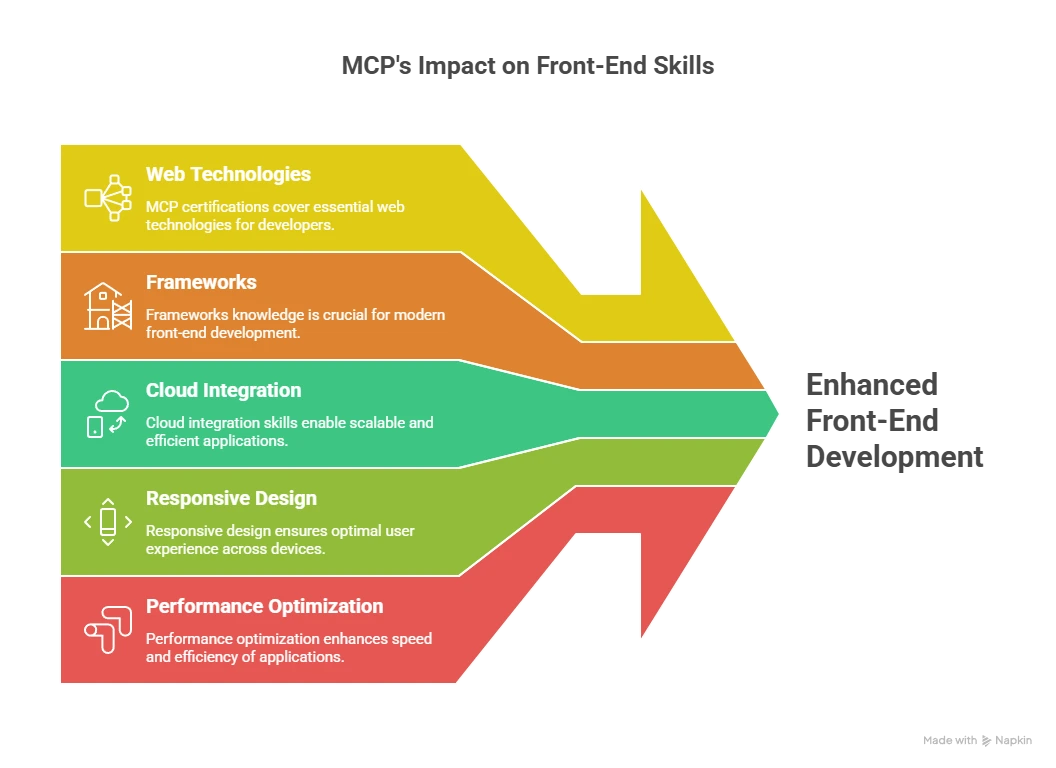In the rapidly evolving field of web development, front-end developers are continually challenged to stay ahead with the latest tools, frameworks, and technologies. As someone who has spent over a decade in software development, I can confidently say that mastering the right Microsoft Certified Professional (MCP) certifications can significantly accelerate your career growth and open doors to advanced roles. But the question is: what are the top MCPs for front-end developers today?
In this blog, we’ll explore the top 10 MCPs specifically tailored for front-end development, explain their relevance, and offer practical insights to help you make informed choices.
Understanding MCP for Front-End Development

MCP, or Microsoft Certified Professional, is a credential that validates your technical expertise and proficiency in Microsoft technologies. While MCPs are often associated with backend, cloud, and infrastructure roles, front-end developers can also benefit significantly from specific MCP certifications. These certifications not only improve your credibility but also ensure that you have a solid grasp of the latest development practices and tools.
For front-end developers, MCPs cover areas such as web technologies, frameworks, cloud integration, responsive design, and performance optimization. These certifications help you build modern, scalable, and maintainable user interfaces.
MCP, or Microsoft Certified Professional, is a credential that validates your technical expertise and proficiency in Microsoft technologies. While MCPs are often associated with backend, cloud, and infrastructure roles, front-end developers can also benefit significantly from specific MCP certifications. These certifications not only improve your credibility but also ensure that you have a solid grasp of the latest development practices and tools.
For front-end developers, MCPs cover areas such as web technologies, frameworks, cloud integration, responsive design, and performance optimization. These certifications help you build modern, scalable, and maintainable user interfaces.
Top 10 MCPs for Front-End Developers
Based on my experience and industry research, here are the top 10 MCP certifications that front-end developers should consider:
1. Microsoft Certified: Power Apps + Dynamics 365 Developer Associate
Front-end developers often need to create user-friendly interfaces for enterprise applications. Power Apps enables developers to design interactive and responsive applications without heavy backend coding. By earning this certification, you demonstrate your ability to integrate front-end solutions with Dynamics 365, making your applications both dynamic and functional.
-
Skills covered: Power Apps development, Canvas and Model-driven apps, integrating with Dataverse.
-
Relevance: High demand in enterprises using Microsoft solutions.
-
Stats: According to LinkedIn, Power Apps developers have seen a 32% growth in demand in 2025.
2. Microsoft Certified: Azure Developer Associate
Cloud integration is increasingly vital for modern front-end applications. Azure Developer Associate validates your ability to build cloud-ready front-end applications using Azure services such as Azure App Service, Azure Functions, and Cosmos DB.
-
Skills covered: Building responsive web apps, integrating APIs, cloud deployment.
-
Practical benefit: Enables you to design scalable front-end applications with serverless architecture.
-
Stats: Over 70% of enterprise web apps now utilize cloud services, making this certification highly relevant.

3. Microsoft Certified: Web Applications Developer
This MCP focuses on fundamental web technologies, including HTML5, CSS3, JavaScript, and TypeScript. While it’s a foundational certification, it’s crucial for any front-end developer.
-
Skills covered: UI/UX design principles, responsive layouts, cross-browser compatibility.
-
Practical insight: Employers often prioritize candidates with demonstrable expertise in standard web technologies.
-
Stats: HTML, CSS, and JS proficiency remains the top requirement in 85% of front-end job postings.
4. Microsoft Certified: React Developer (MCP)
React remains the most widely used front-end framework, powering millions of dynamic web applications. The Microsoft React Developer certification emphasizes component-based architecture, state management, and hooks.
-
Skills covered: JSX, Redux, context API, performance optimization.
-
Practical perspective: React’s component reusability significantly reduces development time.
-
Stats: React dominates the front-end market share with ~40% of web developers using it as their primary library.
5. Microsoft Certified: Angular Developer
Angular, maintained by Google, is another robust front-end framework ideal for enterprise-scale applications. The Angular MCP demonstrates expertise in TypeScript, RxJS, and Angular CLI.
-
Skills covered: SPA development, modular architecture, dependency injection.
-
Practical insight: Angular MCP enhances your credibility for corporate web application projects where structured frameworks are preferred.
6. Microsoft Certified: SharePoint Developer
SharePoint remains an essential platform for enterprise front-end interfaces. This certification validates your skills in custom web parts, client-side development, and SPFx (SharePoint Framework).
-
Skills covered: Client-side development, integration with Office 365, custom SharePoint solutions.
-
Practical perspective: Useful for developers involved in intranet portals or collaboration platforms.
-
Stats: SharePoint remains in use by over 78% of Fortune 500 companies.
7. Microsoft Certified: Azure DevOps Engineer Expert
While DevOps is often considered backend, front-end developers benefit greatly from understanding CI/CD pipelines, automated testing, and deployment strategies.
-
Skills covered: Build pipelines, deployment automation, version control.
-
Practical benefit: Ensures your front-end projects are production-ready and efficiently deployed.
-
Stats: Companies with robust CI/CD pipelines deploy front-end features 30% faster.
8. Microsoft Certified: Office 365 Developer
Office 365 MCP is valuable for front-end developers involved in building custom add-ins, dashboards, or integrated productivity tools.
-
Skills covered: JavaScript APIs for Office, Office Add-ins, Graph API integration.
-
Practical insight: Enhances your ability to create interactive interfaces within the Office ecosystem.
-
Stats: Office 365 adoption is at 88% among enterprises, creating a demand for skilled front-end developers.

9. Microsoft Certified: Power BI Developer Associate
Front-end developers increasingly need data visualization skills. Power BI Developer certification covers interactive dashboards, visual analytics, and embedding reports.
-
Skills covered: DAX formulas, Power BI API, visualization best practices.
-
Practical perspective: Enables you to build compelling and interactive dashboards that enhance decision-making.
-
Stats: 67% of companies now rely on Power BI for reporting, creating opportunities for front-end developers skilled in data visualization.
10. Microsoft Certified: AI Engineer Associate
Modern front-end applications often integrate AI and machine learning for features like chatbots, recommendation engines, or predictive analytics.
-
Skills covered: Cognitive Services, Azure Machine Learning, integrating AI models into web apps.
-
Practical insight: Adding AI capabilities can significantly enhance user experience and engagement.
-
Stats: The AI-enhanced front-end market is projected to grow at 35% CAGR by 2027.
Practical Tips for MCP Preparation
-
Hands-on Projects: Don’t just study theory. Build small projects to apply your skills.
-
Leverage Microsoft Learn: The official learning platform provides free guided paths and practice labs.
-
Time Management: Focus on one MCP at a time; attempt the foundational certifications first.
-
Community Engagement: Join forums, GitHub projects, and LinkedIn groups to stay updated on trends.
-
Track Progress: Use practice exams to identify weak areas before attempting the final test.
FAQs About MCPs for Front-End Developers
1. What is the best MCP for beginners in front-end development?
For beginners, the Microsoft Certified: Web Applications Developer is ideal as it covers HTML, CSS, and JavaScript, forming a strong foundation.
2. Do MCP certifications improve job prospects for front-end developers?
Yes. MCP certifications validate your skills and are highly valued by employers, especially for enterprise roles integrating Microsoft technologies.
3. How long does it take to prepare for an MCP exam?
On average, preparation can take 2-3 months depending on your prior experience and daily study commitment.
4. Are MCPs worth it for freelance front-end developers?
Absolutely. MCPs help freelancers showcase credibility and differentiate themselves in competitive markets.
5. Can a front-end developer earn multiple MCPs?
Yes, it’s common to pursue multiple MCPs, particularly combining Azure, React, and Power BI certifications for a well-rounded skill set.
Resource Center
These aren’t just blogs – they’re bite-sized strategies for navigating a fast-moving business world. So pour yourself a cup, settle in, and discover insights that could shape your next big move.
Chrome DevTools MCP: The Game Changer in AI Development
In today’s fast-paced AI development ecosystem, coding assistants have become an essential part of modern workflows. However, one of the biggest challenges has been the lack of real-time feedback [...]
What Are the Top 5 MCPs for Fullstack Developers?
In the ever-evolving world of software development, staying ahead of the curve is not just desirable—it’s essential. Fullstack developers, who bridge the gap between front-end and back-end development, require [...]
What Are the Top 10 MCPs for Front-End Developers?
In the rapidly evolving field of web development, front-end developers are continually challenged to stay ahead with the latest tools, frameworks, and technologies. As someone who has spent over [...]

